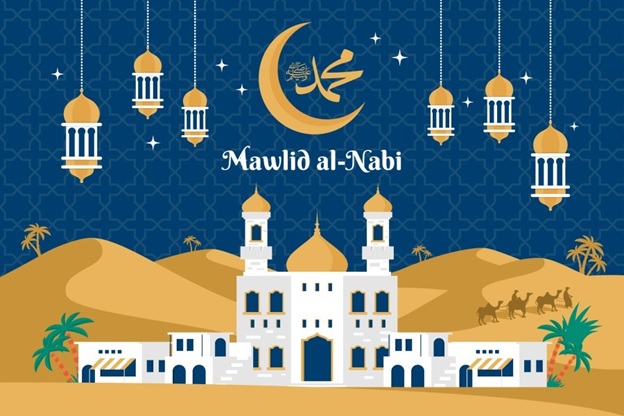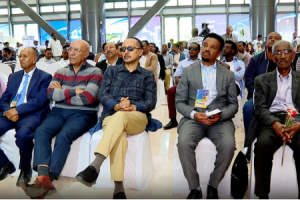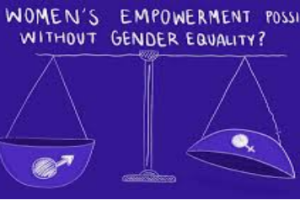
As a land where people with different cultural and religious backgrounds live in harmony, Ethiopian Muslims have a unique way of marking Mawlid with their Christian or non-Christian neighbors by sharing meals and enjoying traditional Ethiopian coffee.
The celebration of Mawlid- the birth of the Islamic Prophet Muhammad- has a special place among Ethiopians. On the day of Mawlid, it is common to see Ethiopians getting together for special prayers, sermons, and religious gatherings. Processions may also take place in some areas, where people march through the streets while chanting Islamic hymns and praising the Prophet Muhammad.
Mawlid is a joyous occasion that fosters unity and togetherness among Ethiopians with diverse background. In addition to its religious significance, the holiday is a special event for most Ethiopian families and communities to come together and share special meal which is prepared for that particular event.
The celebration of Mawlid across Ethiopia may vary from different regions and communities but the core purpose of the event is honoring the birth of Prophet Muhammad.
In his message extended to the Muslim community, Prime Minister Abiy Ahmed (PhD) stressed the importance of togetherness. Prophet Muhammad is revered for his teachings and being an example for promoting virtuousness, opposing injustice, and guiding people towards righteousness. His teachings emphasize the importance of humility, compassion, justice, and forgiveness.
“No matter what our religious background, we, Ethiopians stand together with our Muslim brothers and sisters during this great holiday by observing humility, kindness and forgiveness and elevating our spiritual lives. There is no a problem that cannot be resolved through humility, kindness and forgiveness.”
The Premier also urged Muslims to observe the blessings of Prophet Muhammad and contemplate the ways of humility while celebrating the Mawlid holiday.
In relation to the 2023 Mawlid holiday, The Ethiopian Herald had approached some individuals to reflect their view on the value of Mawlid in further bringing love, togetherness and peace to the people of Ethiopia.
Muhedin Hassan is an Ethiopian born Diaspora living in Seattle, in the United States, who came to Ethiopia recently for a short visit. According to him, like other holidays, most Muslim community mark Mawlid colorfully with their families, friends and neighbors. Islam is all about Salam (peace). The birth of Prophet Mohammad, the prophet and messenger of Allah, has witnessed the value of peace and love among human kinds. “In this regard, whenever we mark the day, peace, love, togetherness, gratitude and tolerance are the core values of our holiday.”
In view of this, when the Muslim community marks the day, it is common to show kindness and thoughtfulness to the needy people. Muslims distribute food, clothes, and other essential support to the needy, emphasizing the importance of helping others and fulfilling charitable obligations.
Asked how he relates his experience here in Ethiopia with that of Seattle, Muhedin said: “So far, I did not mark Mawlid in the US. Rather, here in Addis Ababa, I had several experiences of marking the days with families and friends. Whenever I came home to visit my families and friends, I have witnessed the power of holidays in bringing people of different culture and identities into one circle and to share common values.”
This togetherness, according to him, is not only among the Muslim community; but also with other members. “I have witnessed this several times. Whenever there is Christians’ holiday, it is common to gather with non-Christian neighbors and mark the day colorfully. Sharing traditional meals, drinking coffee and experiencing the holiday vibe with neighbors have a special place in my heart. This is what I always miss when I am away from my homeland.”
Regarding the role of holidays in nurturing peace and tolerance, Muhedin said that, maintaining peace and tolerance is in the hands of every individual. The more every individual capitalize on peace and tolerance, the more rewarding results he/she would get. In this regard, holidays have a significant role in bringing people of different cultural backgrounds together and experience the power of forgiveness and act of kindness.
“I had a chance to visit several places in Ethiopia and was able to witness tolerance and love among Ethiopian people. I am able to disprove the misinformation that is being circulated on social media. Overcoming divisions and conflict, promoting peace and tolerance should be the only mission of every Ethiopian to overcome all forms of conflicts. When individuals and communities embrace tolerance and respect the cultural values and religious beliefs of others, conflicts based on religious differences or other grounds can be reversed, Muhedin opined.
Promoting dialogue and nurturing understanding on differences further promote peaceful religious coexistence. This dialogue further enhances understanding, fosters empathy, and helps dispel misconceptions or stereotypes that can lead to tensions or conflicts. In this regard, religious leaders and followers should be role models to their children and family members as well.
Abdurezak Mohammed is a journalist by profession. He is among those Ethiopians who knew the art of living in love and tolerance. Responding how he defines Ethiopianism with that of tolerance in times of holidays, Abdurezak said, tolerance is an important thing to live with peoples that have different ethnic, cultural, or religious background and opinions. Islam is the religion of peace, tolerance, forgiveness and kindness.
According to him, Ethiopians have a long-standing tradition of celebrating holidays together. Muslims show their love for their Christian brothers and sisters by cleaning streets/places during holidays like Meskel Demera, Timket; and sharing food and other things. Christians do similar things during Muslims’ holidays like Eid al-Fitr, Eid al-Adha, Mawlid.
Amare Adamu, is a project consultant for a private firm here in Addis Ababa. The Ethiopian Herald had a short stay with him while he was preparing to mark the feast of Meskel which is one of the grand holydays for followers of the Ethiopian Orthodox Christian.
Asked what his impression is to mark the Muslims and Christians holydays in consecutive days, Amare said that seeing churches and mosques decorated with lights, banners, and colorful fabrics to mark the Mawlid and Meskel and watching followers of the two religion helping each other to mark the days colorfully and living in harmony is a living testimony of love and solidarity.
He also commented that religious tolerance and togetherness are indeed crucial to ensure sustainable peace for the Ethiopian society. “Respect for diversity is one of the qualities of modern society. Embracing religious difference and tolerance means recognizing and respecting this diversity as it promotes an environment where people from different religious backgrounds live together peacefully. This is what is needed for Ethiopia and to the coming generation.”
Religious peace, tolerance, and togetherness facilitate sustainable peace to Ethiopia by promoting respect, understanding, dialogue, and cooperation among diverse religious communities. Embracing these values can contribute to a more harmonious and inclusive society where people can live together in peace and mutual respect.
BY LEULSEGED WORKU
The Ethiopian Herald September 28/2023





